“Are You Not Still Entertained?”: Gladiator’s 10-Year Oscar Anniversary
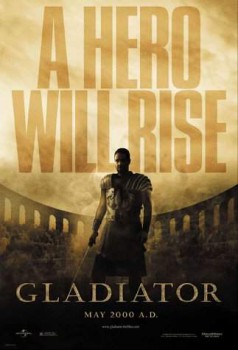 As of Sunday evening, The King’s Speech is the newest Academy Award winner for Best Picture. I am sure a virulent backlash against the English period drama is already underway, but let the record show that I thoroughly enjoyed that movie. It is not my personal pick for the best film of 2010. I would have liked Black Swan, Inception, or True Grit to win, but such was not to be, and The King’s Speech as a winner doesn’t anger me.
As of Sunday evening, The King’s Speech is the newest Academy Award winner for Best Picture. I am sure a virulent backlash against the English period drama is already underway, but let the record show that I thoroughly enjoyed that movie. It is not my personal pick for the best film of 2010. I would have liked Black Swan, Inception, or True Grit to win, but such was not to be, and The King’s Speech as a winner doesn’t anger me.
However, I prophesy that The King’s Speech will go down in history as one of the Oscar winners with scant staying power. Remember Shakespeare in Love? Chances are you haven’t thought of it much at all. The same can be said for numerous winners since the awards started in 1929: movies that had their moment, and then faded back as the “losers” turned into perennials. No one has much interest in Cavalcade (winner for 1933, the year of King Kong and Duck Soup) or The Great Ziegfield (winner for 1936) today; 1952’s The Greatest Show on Earth is the butt of jokes about “Worst Best Picture Ever”; and even the recent A Beautiful Mind has blipped off the pop-culture radar fast, while Crash’s win tends to get people upset.* I can even mount an argument that the massively popular win for Forrest Gump has been overshadowed in the ensuing years by the everlasting popularity of two of its competitors, The Shawshank Redemption and Pulp Fiction.
But many Academy wins have lasted. It is amazing to realize that Casablanca was a surprise victory in 1943, upsetting favorite Watch on the Rhine. When was the last time you quoted or heard someone quote Watch on the Rhine? Other enduring winners include The Sound of Music, Gone with the Wind, Rocky, Platoon, and from the last twenty years The Silence of the Lambs (this year is its twentieth anniversary as a winner) and Unforgiven.
Which brings me to this year’s tenth-anniversary winner. Where does Ridley Scott’s Roman epic Gladiator stand today, a decade after it received five Oscars at the 73rd Annual Academy Awards?
I am probably preaching to the choir on this one, since Gladiator is a style of historical blood-n-thunder filmmaking that generally appeals to the Black Gate demographic. But if video sales over the years and the prevalence of special editions and placement on “Best” lists are anything to go by, then Gladiator has aged extraordinarily well. There was a small backlash against its win in 2001, but not to the degree of what Titanic suffered, and the film came through it. I feel confident saying that that Gladiator is a perennial.
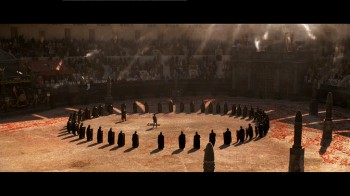 Did Gladiator deserve the Oscar that year? Its main critical competition was Steven Sorderbergh’s excellent multi-protagonist drug-pipeline drama Traffic, and in the realm of swordplay there was also Ang Lee’s fantasy Crouching Tiger, Hidden Dragon. The “better-not-win” feel-good film Chocolat seemed to pose some threat with a barrage of advertising, but in the long view it had no chance and is the most forgotten of the five nominees. (The fifth nominee was Erin Brockovich, and it is amazing that Sorderbergh managed to win in the Director category considering he had to split votes with himself between Erin Brockovich and Traffic.)
Did Gladiator deserve the Oscar that year? Its main critical competition was Steven Sorderbergh’s excellent multi-protagonist drug-pipeline drama Traffic, and in the realm of swordplay there was also Ang Lee’s fantasy Crouching Tiger, Hidden Dragon. The “better-not-win” feel-good film Chocolat seemed to pose some threat with a barrage of advertising, but in the long view it had no chance and is the most forgotten of the five nominees. (The fifth nominee was Erin Brockovich, and it is amazing that Sorderbergh managed to win in the Director category considering he had to split votes with himself between Erin Brockovich and Traffic.)
Although I loved Traffic back in 2000, it was Gladiator I rooted for at the 2001 ceremony, and ten years later I stand behind it as the best choice. I haven’t watched Traffic in years or felt a need to, while I just purchased the Sapphire Edition of Gladiator on Blu-ray and viewed some of its battle scenes for the five-hundredth time. The movie holds up. I watched it three times when it was in theaters, bathing in its glorious Roman spectacle of honor and bloodshed, and I have lost none of my adoration over the years for it as robust storytelling.
At the time that Gladiator won Best Picture, the press attributed its success as a “throwback” to earlier historical spectacle Oscar-winners, in particular the sweeping wins for the 1959 version of Ben-Hur. The fifties were filled with nominations for Roman historical epics, such as The Robe (the first movie in CinemaScope) and Quo Vadis. The love for the costume spectacular has spilled over for other winners outside of the Roman reign: Braveheart, The Lord of the Rings: The Return of the King, and Titanic are recent-year winners that benefited from an Academy attraction to the big-n-bold-and-looking-old.
And why not? The Oscars themselves are a spectacle larger than life, even with the rotten jokes and the obnoxious Red Carpet fashion vultures. A historical epic, when delivered with a strong enough story, creates the kind of magic that makes us love going to the movies.
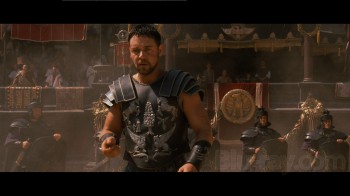 (An aside: With my recent switch to Blu-ray, I finally had the chance to see Quo Vadis and The Robe in the proper fashion, fully restored to the hi-gloss premiere appearances. Both movies are breathtakingly beautiful, particularly the CinemaScope restoration of The Robe, which Martin Scorsese introduces on the Blu-ray, remarking that seeing the wide image of that film for the first time was a seminal experience in his life. I found the scripts and action in both films lacking, especially compared to Ben-Hur, Spartacus, and Anthony Mann’s stunning The Fall of the Roman Empire — which occurs in the same time frame as Gladiator and which I plan to review on Black Gate one day — but the 1080p visual experience for these older films more than makes up for their flaws.)
(An aside: With my recent switch to Blu-ray, I finally had the chance to see Quo Vadis and The Robe in the proper fashion, fully restored to the hi-gloss premiere appearances. Both movies are breathtakingly beautiful, particularly the CinemaScope restoration of The Robe, which Martin Scorsese introduces on the Blu-ray, remarking that seeing the wide image of that film for the first time was a seminal experience in his life. I found the scripts and action in both films lacking, especially compared to Ben-Hur, Spartacus, and Anthony Mann’s stunning The Fall of the Roman Empire — which occurs in the same time frame as Gladiator and which I plan to review on Black Gate one day — but the 1080p visual experience for these older films more than makes up for their flaws.)
The major difference between the earlier Roman epics and Gladiator is that the ‘50s films usually focused on early Christianity within the empire. Ben-Hur, The Robe, and Quo Vadis are all based on novels with Christian inspirational messages. Gladiator, although occurring at a time when Christianity had spread throughout the empire, never even mentions the religion. Ridley Scott did shoot a scene of martyrs in the arena with lions, but it did not make his final cut. The “Extended Edition” released in 2005 contains this scene, but Scott has stated that the Extended Edition is not his preferred cut, and I concur. The inclusion of the Christian martyr scene is a distracting reminder of territory other films have already covered so well, and it doesn’t contribute to Gladiator’s tale. (I think that all the extra scenes in the longer cut are unnecessary and more interesting seen as independent deleted footage, but at least the current DVD and Blu-ray contain the original cut as well.)
Gladiator instead puts its camera lens on a clash of Roman ideals, Empire vs. Republic, and the ancient sense of honor. The religious experience of the film is a decidedly Greco-Roman one, visualized as a wheat field around the walls of Elysium. At the core, Gladiator is a revenge story, giving Maximus a journey through the hell of the gladiatorial world to come face-to-face with the Emperor Commodus, the man who had his family killed. In the process of Maximus’s fight, waged as the unconquerable force on the Coliseum’s sands, Rome undergoes a revolution against Commodus’s tyrannical reign.
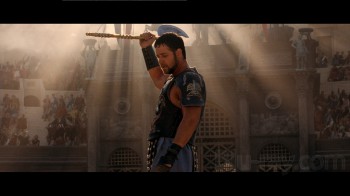 This is all historical hogwash. Although Commodus did like to dress up in Hercules gear and join in the arena battles, he didn’t die there. He really met his end in the bathtub, where all decent insane emperors should. Historians of the time tell us that his wrestling partner Narcissus strangled him in the tub, but I suspect he slipped on the soap and Narcissus merely took the credit. And the end of Commodus’s reign did not herald a return to the Republic, as the film’s conclusion implies. However, Gladiator makes no pretense of telling a historically accurate tale. In its presentation of Roman life and in Arthur Max’s production design it achieves one of the most accurate appearances of authentic ancient Rome put on film, making the movie an interesting clash between outer (visual) and inner (story) accuracy. I can say on my part that the invented story works for me, and the visuals, performances, and script (long haggled over and changed on-set numerous times) make me feel as if I’ve inhabited the Empire for two and half hours each time I watch it. It makes me want to poison my relatives.
This is all historical hogwash. Although Commodus did like to dress up in Hercules gear and join in the arena battles, he didn’t die there. He really met his end in the bathtub, where all decent insane emperors should. Historians of the time tell us that his wrestling partner Narcissus strangled him in the tub, but I suspect he slipped on the soap and Narcissus merely took the credit. And the end of Commodus’s reign did not herald a return to the Republic, as the film’s conclusion implies. However, Gladiator makes no pretense of telling a historically accurate tale. In its presentation of Roman life and in Arthur Max’s production design it achieves one of the most accurate appearances of authentic ancient Rome put on film, making the movie an interesting clash between outer (visual) and inner (story) accuracy. I can say on my part that the invented story works for me, and the visuals, performances, and script (long haggled over and changed on-set numerous times) make me feel as if I’ve inhabited the Empire for two and half hours each time I watch it. It makes me want to poison my relatives.
The performances of the film still stand out. That Russell Crowe was able to go from the pudgy scientist of The Insider to a sword-wielding badass here is a testament to the man’s acting chops. It’s unfortunate that his recent track record is a string of forgettable mid-level performers, but in 2000 Crowe was a genuine charismatic star and the perfect person for the part. Joaquin Phoenix, who has recently ended a yearlong stunt where he purposely trashed his own career, was also a shining part of the cast as Maximus’s opposite, Commodus. Just watch the quick cuts to him in the stands during the gladiatorial fights: his weird expressions and facial gesticulations are marvelous and say more about the character than most of his dialogue.
Two great elder actors in Gladiator have died since its making. Oliver Reed died during filmmaking, actually (use of a double and some editing tricks completed the part), and Richard Harris died in 2002. Both famously hard-living actors got to deliver great farewell performances in Gladiator. Harris still had the first two Harry Potter movies and The Count of Monte Cristo to do, but Gladiator gives him the most appropriate last bow as the philosophical emperor Marcus Aurelius. And Oliver Reed, playing the mentor figure of gladiator manager Proximo, almost steals the show. His scene opposite Russell Crowe where he explains, with trembling memory, the thrill of being a gladiator, is the best dramatic scene in the film. Watching this, I can see Reed reaching back through his own tumultuous career and bringing it all out in his delivery where his passion is choking his ability to put the experience into words: “Oh, you should see the Coliseum, Spaniard. Fifty thousand Romans, watching every movement of your sword, willing you to make that killer blow. The silence before you strike, and the noise afterwards . . . it rises . . . it rises up like . . . like . . . like a storm. As if you were the Thunder God himself.” He also has the line that provides a succinct summary of one of the film’s themes: “Ultimately, we’re all dead men. Sadly, we cannot choose how, but what we can decide is how we meet that end, in order that we are remembered, as men.” I miss Oliver Reed.
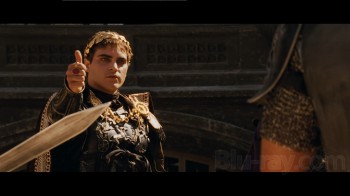 Although a decade of effects technological advancement has passed since Gladiator’s premiere, the big spectacle action sequences haven’t aged a bit. The extensive practical stuntwork and the fight choreography have a timeless thrill. The story explodes with the battle against a German tribe on the north frontier (the crew got permission to burn down a forest in England that was marked for clearing) and reaches its action height in its equivalent of the chariot race from Ben-Hur: Maximus leading his gladiators on the ground against golden chariot-riding adversaries in their debut in the Coliseum. I never get tired of the bloody spectacle of this piece of action filmmaking. It strikes the perfect level of over-the-top mayhem.
Although a decade of effects technological advancement has passed since Gladiator’s premiere, the big spectacle action sequences haven’t aged a bit. The extensive practical stuntwork and the fight choreography have a timeless thrill. The story explodes with the battle against a German tribe on the north frontier (the crew got permission to burn down a forest in England that was marked for clearing) and reaches its action height in its equivalent of the chariot race from Ben-Hur: Maximus leading his gladiators on the ground against golden chariot-riding adversaries in their debut in the Coliseum. I never get tired of the bloody spectacle of this piece of action filmmaking. It strikes the perfect level of over-the-top mayhem.
The film also has a magnificent swelling score that was the first Hans Zimmer soundtrack I ever loved. The battle music uses a dance tempo influenced by Gustav Holst, and Lisa Gerrard’s “ethnic chanting” has turned into a cliché for historical films ever since, much the same way that Jerry Goldsmith made Satanic choirs a requirement for horror films after his Oscar-winning score to The Omen in 1976.
So ten years gone, and Gladiator still has swaggering rights. Of the Best Picture winners from 2000-2009, it and The Lord of the Rings: The Return of the King and No Country for Old Men have the best chances of emerging through the shadows and dust of history as long-term favorites.
The only competitor to Gladiator’s memory from the 2001 Academy Awards? Björk’s swan dress. I was afraid Natalie Portman would ask to borrow it for this year’s awards and dye it black. But it probably wouldn’t fit a pregnant woman.
* If David Cronenberg’s movie Crash had won Best Picture, we would definitely be having a different conversation.
Ryan Harvey is a veteran blogger for Black Gate and an award-winning science-fiction and fantasy author. He received the Writers of the Future Award in 2011 for his short story “An Acolyte of Black Spires,” and has two stories forthcoming in Black Gate and a number of ebooks on the way. He also knows Godzilla personally. You can keep up with him at his website, www.RyanHarveyWriter.com, and follow him on Twitter.
Crash sticks with me to this day…
Which one, Scott? I assume you mean the good one…
Nice to see you unleashing the hell, Ryan. I still love this movie, used to watch it with my Dad all the time, and then we’d go beat up on some Macromanni.
Of course that should be ‘Marcomanni’ — Macromanni are a cheesy side-dish and no threat whatsoever to our Danubian frontier.
I adore Crouching Tiger, Hidden Dragon. Gladiator didn’t really do anything for me when I watched it years ago.
Well, heck. I still quote “Shakespeare in Love,” myself. Tom Stoppard script, polished cast (including my boy Geoffrey Rush), clever directing, great costumes — SHAKESPEARE! — what more could I ask of a movie? (Although, I liked “Elizabeth” better that year, I must confess.)
I loved Gladiator too; it was monstrous good and I own it. “I did not know men could build such things.” And the part when the hunter asks about angering the gods! Oh, so much awesome in that movie.
The same can be said of Beautiful Mind, though — but I’m fond of an imaginative biopic, and in general just like watching Crowe go chameleon.
I, too, quote Shakespeare in Love, at work, as a publisher, and as a con-runner.
Of course, I also just watched The Great Ziegfeld a couple of weeks ago.